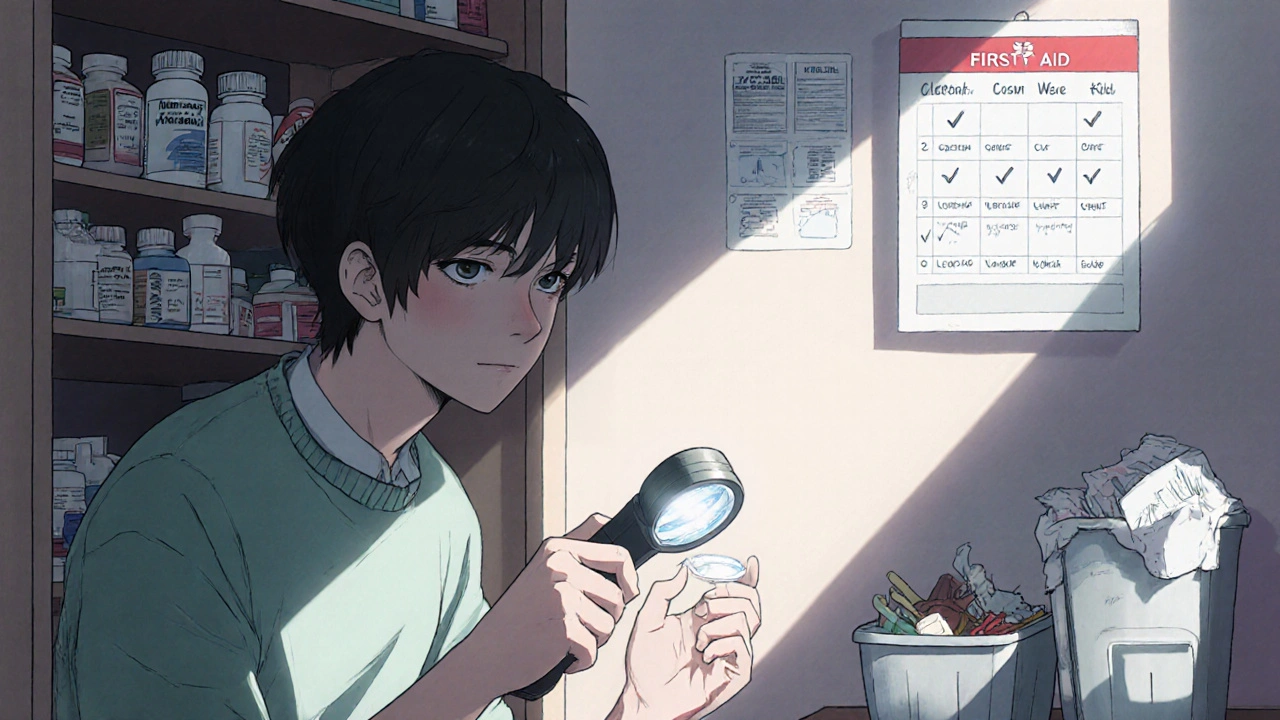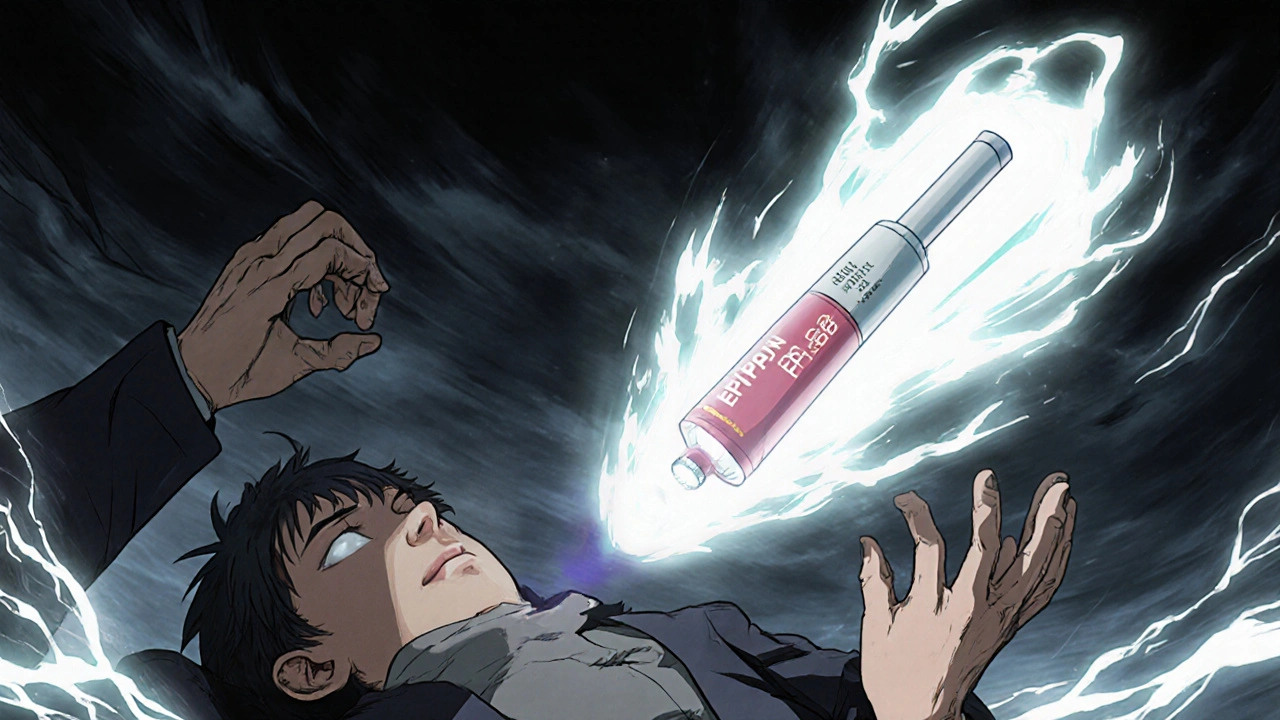Most households keep a first-aid kit tucked away in a bathroom cabinet or kitchen drawer, assuming it’ll work when needed. But if you haven’t checked it in over a year, you might be relying on medicine that no longer works-or worse, could be unsafe. Expired OTC first-aid medications are a silent risk. They don’t explode or turn toxic like in movies. Instead, they quietly lose strength, become contaminated, or fail when you need them most.
Not All Expired Medications Are the Same
Just because a pill or cream has passed its printed date doesn’t mean it’s dangerous. But it does mean it might not do what it’s supposed to. The FDA sets expiration dates based on real-world testing: how long the drug stays stable, potent, and safe under normal storage conditions. Solid medications like ibuprofen, acetaminophen, and aspirin tend to hold up well. A 2019 U.S. Department of Defense study found that 80% of these pills retained at least 90% potency even 15 years past expiration-when stored properly in cool, dry places.But that’s not true for everything. Liquid medications, creams, and emergency treatments degrade fast. Epinephrine auto-injectors (EpiPens), for example, lose 20-30% of their potency within six months of expiration. Nitroglycerin tablets, used for heart attacks, start breaking down the moment the bottle is opened. If you use an expired EpiPen during a severe allergic reaction, it might not stop swelling or breathing trouble. That’s not a gamble you should take.
These Five Items Must Be Replaced Immediately After Expiration
The FDA and American Red Cross agree: some medications are too critical to risk. Never use these past their expiration date:- Epinephrine auto-injectors (EpiPen, Adrenaclick): Lose potency rapidly. Partial effectiveness can mean delayed treatment and worse outcomes.
- Nitroglycerin tablets: Used for chest pain. They oxidize quickly after opening-even if unexpired, replace every 3-6 months.
- Liquid antibiotics (like amoxicillin suspension): Bacteria can grow in them after expiration. Taking them might not kill the infection, but could lead to antibiotic resistance.
- Eye and ear drops: Sterility breaks down. Contaminated drops can cause serious infections, including corneal ulcers.
- Insulin: Even if it looks fine, degraded insulin won’t control blood sugar properly. This is life-threatening.
These aren’t just "better safe than sorry" items. They’re medical emergencies waiting to happen. If your EpiPen expired last month and you have a known allergy, buy a new one today-not tomorrow, not when you have time.
What About Pain Relievers and Antihistamines?
Here’s where things get practical. If your ibuprofen expired six months ago and you have a headache, it’s probably still fine. Research from the University of California San Francisco shows that solid pain relievers retain 90-95% potency for 1-2 years past expiration if stored right. Same goes for diphenhydramine (Benadryl)-it holds up well for about 18 months after expiration.But there’s a catch. You need to check the physical condition. If the pills are cracked, discolored, or smell weird, toss them. If the bottle is open and the pills are sticky or chalky, they’ve absorbed moisture. That’s not just weak-it’s risky. The same goes for antihistamine liquids. They’re more prone to contamination than pills.
And don’t assume your hydrocortisone cream is safe. A 2023 FDA lab study found that 47% of expired hydrocortisone creams showed bacterial growth. That’s not just ineffective-it could turn a small rash into a full-blown skin infection.

Storage Matters More Than You Think
Your medicine doesn’t just expire because of time. It expires because of heat, humidity, and light. Storing your first-aid kit in the bathroom? That’s one of the worst places. Showers, steam, and sinks create humidity levels over 75%. That’s enough to ruin pills, creams, and liquids in months.A 2022 Johns Hopkins study compared storage conditions. Medications kept in a bedroom drawer (68°F, 45% humidity) stayed stable far longer than those in a bathroom cabinet (82°F, 75% humidity). The bathroom group lost potency 40% faster.
Here’s what to do:
- Keep your kit in a cool, dry place-like a bedroom closet or kitchen cabinet away from the stove.
- Leave medications in their original bottles. Those bottles have moisture-absorbing packets inside.
- Don’t transfer pills to pill organizers unless you’re using them daily. Once moved, shelf life drops by 35-50%.
- Avoid direct sunlight. A sunny windowsill is a drug killer.
If you’ve been storing your first-aid kit in the bathroom, you’re not alone. But you’re also risking your health.
How Often Should You Check Your First-Aid Kit?
The American Red Cross recommends checking your kit every three months. That’s not a suggestion-it’s a safety habit. Here’s how to do it right:- Look: Check for discoloration, strange smells, or changes in texture. Creams that separate, pills that crumble, or liquids that look cloudy? Toss them.
- Check dates: Go through every item. Mark expiration dates on a calendar or use a sticky note on the kit. Don’t rely on memory.
- Replace emergency items early: Swap out EpiPens, nitroglycerin, and insulin 30 days before they expire. That way, you’re never caught off guard.
- Do a full overhaul once a year: Take everything out. Clean the container. Restock bandages, gauze, antiseptic wipes. Throw out anything questionable.
Most people don’t do this. A 2023 survey found 68% of households have at least one expired item in their first-aid kit. That’s not just lazy-it’s dangerous. When an emergency happens, you won’t have time to dig through old pills.
What Happens If You Use an Expired Medication?
The good news? Most expired painkillers won’t hurt you. They just won’t help much. The real danger is in the ones you think are working when they’re not.Take epinephrine. A 2022 Healthline forum thread collected 43 stories from people who used expired EpiPens. Half said it helped a little. The other half said it did nothing. One woman used her expired pen during a reaction, then had to be rushed to the hospital because it didn’t stop her swelling.
Antibiotics are another silent threat. If an expired liquid antibiotic doesn’t fully kill the bacteria, the surviving germs can become resistant. That means the next time you need it-maybe for a child’s ear infection-it won’t work at all. That’s not a myth. It’s documented in clinical studies.
And don’t forget bandages. Adhesive strips lose 40% of their stickiness after 18 months. Sterile gauze can harbor bacteria after 24 months-even if the package is sealed. In a wound, that’s an infection waiting to happen.

What Should You Do With Expired Medications?
Don’t flush them. Don’t throw them in the trash where kids or pets might get to them. Don’t just leave them in the cabinet.The safest way is to use a drug take-back program. The DEA’s National Prescription Drug Take Back Day collected over a million pounds of expired meds in October 2023. Many pharmacies and police stations now offer year-round drop-off bins. If that’s not available, mix pills with coffee grounds or cat litter, seal them in a plastic bag, and toss them in the trash. That makes them unappealing and harder to misuse.
For liquids, don’t pour them down the drain. Check local guidelines. Some communities have special disposal events for hazardous household waste.
Smart Kits Are Coming-But You Don’t Need One
New tech like Bluetooth-enabled first-aid kits that send reminders before expiration are popping up. Some even have temperature sensors that warn you if your meds got too hot. These are cool-but not necessary.You don’t need a $100 smart kit to stay safe. All you need is:
- A calendar reminder every three months
- Five minutes to check your kit
- The discipline to replace emergency meds before they expire
That’s it. No app. No gadget. Just consistency.
Final Rule: When in Doubt, Toss It
There’s no shame in throwing out old medicine. There’s huge risk in keeping it. If you’re unsure whether something’s still good, err on the side of caution. Painkillers? Replace them if they’re more than two years past expiration. Emergency meds? Replace them the day they expire. Creams? If they look or smell off, throw them away.Your first-aid kit isn’t a decoration. It’s your first line of defense in a crisis. Make sure it’s ready.
Can I still use expired ibuprofen or acetaminophen?
Yes, if they’re solid pills, stored properly, and show no signs of damage. Most retain 90%+ potency for 1-2 years past expiration. But if they’re cracked, discolored, or smell odd, toss them. Never use expired liquid versions.
Why do some medications expire faster than others?
Liquid medications, creams, and injections break down faster because they’re exposed to air, moisture, and bacteria. Solid tablets are more stable because they’re sealed and dry. Epinephrine and nitroglycerin are especially sensitive to heat and oxygen, so they degrade quickly-even in sealed containers.
Is it dangerous to take expired antibiotics?
Yes. Expired liquid antibiotics can lose potency, allowing bacteria to survive and become resistant. This doesn’t just make the current infection worse-it can make future infections harder to treat. Solid antibiotics are less risky, but still not recommended past expiration.
Should I replace my EpiPen before it expires?
Absolutely. Replace it 30 days before expiration. Epinephrine loses 20-30% potency within six months of expiration. In a life-threatening allergic reaction, you need full strength. Don’t risk partial effectiveness.
Where’s the best place to store a first-aid kit?
In a cool, dry, dark place like a bedroom closet or kitchen cabinet away from heat sources. Avoid bathrooms, garages, and cars. Humidity and heat are the biggest enemies of medication stability.
How often should I check my first-aid kit?
Every three months for a quick check (look for damage, smell, discoloration) and once a year for a full restock. Mark expiration dates on a calendar or sticky note so you don’t forget.








Jonah Thunderbolt November 28, 2025
Wow. Just… wow. 🤯 I had no idea my EpiPen was basically a fancy paperweight after 6 months. I’ve been keeping mine in the bathroom since college-alongside my expired Benadryl and that weird cream I got from a guy at a music festival. I’m replacing everything today. Also, why does my hydrocortisone smell like old socks now?? 😅
reshmi mahi November 30, 2025
India has been doing this for decades. We don’t have fancy expiry dates-we have ‘use it before it kills you’ dates. Also, why are you all acting like this is news? We’ve been tossing expired meds since our grandmas taught us not to trust plastic bottles with printed dates. 🇮🇳
Gayle Jenkins December 1, 2025
This is so important. I used to be the person who said ‘it’s probably fine’-until my neighbor’s kid had an allergic reaction and the EpiPen didn’t work. She’s fine now, but it took three ER visits and a $12,000 bill. Don’t be that person. Replace your emergency meds like clockwork. Your future self will thank you. 💪
Frances Melendez December 3, 2025
Of course you’re storing it in the bathroom. You’re the same person who leaves their toothbrush in the shower and wonders why it smells like mildew. 🙄 This isn’t just negligence-it’s a character flaw. If you can’t manage a first-aid kit, how are you managing your life? I’ve been checking mine every 60 days since 2017. You should be ashamed.
Sam HardcastleJIV December 4, 2025
One must consider the epistemological implications of expiration dates: Are they objective markers of decay, or are they constructs of pharmaceutical capitalism designed to perpetuate consumption? The FDA’s authority over temporal stability is not absolute-it is institutionalized. One might argue that the true expiration lies not in the pill, but in our collective surrender to institutional authority. The body, after all, has its own wisdom. Do we not trust it? Or do we trust the label more?
laura lauraa December 5, 2025
How dare you suggest that ibuprofen is safe past its date? Have you read the studies? Have you considered the microbiome disruption caused by degraded compounds? The placebo effect is not a substitute for pharmacological integrity. And let’s not forget the psychological danger of false confidence-this isn’t about medicine, it’s about denial. I’ve seen people die because they thought ‘it’s just expired’-and now I have nightmares. Every. Single. Night.
Kaleigh Scroger December 5, 2025
I’ve been a nurse for 18 years and I can tell you this-storage matters more than expiration dates. I’ve seen pills from 2012 that still worked because they were kept in a sealed container in a climate-controlled closet. And I’ve seen brand new bottles of liquid antibiotics ruined by a humid garage. The key is environment not the calendar. Also if you’re using a pill organizer for anything other than daily meds you’re asking for trouble. The moisture from your hands alone can degrade them. And please stop putting your first aid kit near the microwave. I’ve seen melted ibuprofen. It’s not a snack.
Edward Batchelder December 6, 2025
Thank you for this. I’m from a rural community where people still use expired meds because they can’t afford replacements. This isn’t just about health-it’s about equity. If we want people to follow guidelines, we need to make replacements accessible. Pharmacies should offer free or discounted emergency med renewals. No one should have to choose between insulin and groceries. Let’s not shame people for being broke-let’s fix the system.